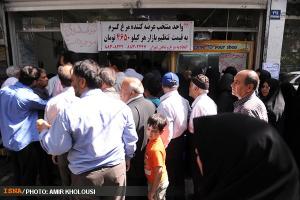 Queuing for Chicken, July 2012Jonathan Saul and Marcus George write for Reuters:
Queuing for Chicken, July 2012Jonathan Saul and Marcus George write for Reuters:
Iran's food distribution system is in crisis even though Western sanctions do not directly target the market, badly hurting the poor and turning some staples into luxuries.
Private importers are shrinking away from deals made risky by turmoil in the rial currency, and many foreign banks are reluctant to finance even trade exempt from the sanctions for fear of drawing fire simply for doing business with Iran.
The result is that the Iranian state is under growing pressure to import and allocate more goods as it tries to avoid any social unrest due to shortages and soaring prices.
An increasingly shaky state apparatus will struggle to fill the gap often left by private companies, analysts say.
"If you are talking about the number of deals needed for a country of 75 million ... you do not have an organized overall strategy for finance, purchase and distribution. I do not think they can cope with the challenge," said Scott Lucas, a specialist in Iranian affairs at Birmingham University.
"Even if the sanctions were lifted, which is a huge if, the problems in the system are now so endemic I think they face real serious structural problems."
Sanctions led by the United States and European Union, designed to halt Iran's nuclear program, are strangling the economy and particularly energy exports, but so far Iranians do not face a widespread humanitarian crisis.
Nevertheless, many foreign foods are hard to find and high prices mean Iranians cannot always afford even basic items.
Hossein, a Tehran shopkeeper, described the problems faced particularly by the poor. "A few days ago an elderly woman came to my shop to buy 12 eggs, but when I told her how much she had to pay, she decided to just take five. I really felt bad because she is old and lives by herself," he said by telephone.
The problems have become politically charged. Earlier this year Iran's police chief urged television stations not to show people eating chicken to avoid fueling social tensions, as a jump in poultry prices has made it a rarity in many homes.
Even the relatively well-off are feeling the effects. "Not only have we had to cut back on less important things, we are also forced to purchase local products. I haven't had real, good chocolate for a long time," 25-year-old management student Sanaz said by phone from Tehran.
Iran is estimated to consume around 15.5 million tonnes of wheat a year and about 2.6 million tonnes of sugar.
The sanctions on the nuclear program --- which Western governments fear is aimed at making weapons, despite Iranian denials --- helped to push the rial into a nosedive earlier this year. The currency has since stabilized, but importers are finding it increasingly difficult to buy dollars for purchases, and are wary of getting caught out by another currency swing.
Instead, many commercial buyers are preferring to lock in their wealth in real estate or safe haven assets such as gold.
***
International trade sources say Iran is also having to grapple with a banking freeze, which has led to private traders cutting imports of staples such as grain and sugar.
Some banks fear their reputation will suffer with Western clients if they finance any Iranian trade, even when it is legal, and therefore prefer not to take the risk.
A senior executive with an international commodities firm said it had stopped food trade with Iran. "We are running scared. Even though the food trade is not contravening sanctions, our banks could turn around and say they are not happy, so the relationship risk is a big factor now," the executive said.
In one blow, an official with the Geneva-based private banking branch of India's Hinduja Group said this month that tougher U.S. measures introduced in July by the Office of Foreign Asset Controls had forced it to stop providing trade finance for food and pharmaceuticals to Iran.
"The private sector is the main casualty of the sanctions. Private buyers are still able to import but in much smaller volumes than in the past and at much higher prices," a European based grain trader said.
A Dubai-based official with Afra Holding, a unit of a large Iran-based conglomerate, said the group had scaled back cargoes of sugar and grain to one shipment a month from five vessels previously, citing payment difficulties caused by sanctions.
Government buyers, including state food body GTC, are playing a bigger role to maintain strategic stocks.
A GTC official told Reuters by phone that it had "no limits" on importing sugar and grains, and was buying directly from companies at suitable prices. GTC was importing around 60,000 tonnes a month, mostly of wheat, the official said.
Posted via email from lissping
No comments:
Post a Comment
Note: only a member of this blog may post a comment.